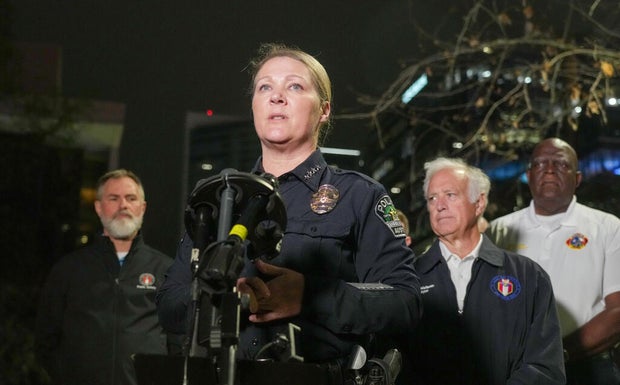News
Meet the 23-Year-Old Student Who Raised $25 Million in Democratic Losses

After the Democratic candidates in Florida’s special elections burned through millions and millions of dollars on the way to double-digit losses this week, some Democrats are asking where that money deluge came from — and where it all went.
The answer to both questions is, in part, a 23-year-old law student and dungeon master — in Dungeons & Dragons — with a lucrative side gig.
In between classes and fantasy play, Jackson McMillan is also the chief executive of Key Lime Strategies, a small fund-raising firm in Florida that scored big when it landed as clients the two Democratic nominees in the Florida congressional elections, Josh Weil and Gay Valimont. Mr. McMillan said they had combined to raise $25 million.
“We’ve built a juggernaut,” he said in an interview.
Along the way, Mr. McMillan has piled up critics far beyond his years. Much of the focus is on his unusual fee structure, which one top party official excoriated in a cease-and-desist letter as “exorbitant.” His firm received a 25 percent cut of “true profits” — the proceeds after fund-raising expenses — for both special elections.
Mr. McMillan is unapologetic.
“A lot of the people who are critiquing me online are mad that it wasn’t them,” he said of raising so much money, which he said put a scare into Republicans and injected real money into long-neglected corners of a rightward-drifting state.
One secret ingredient to his firm’s success, Mr. McMillan explained, is Dungeons & Dragons.
“All the senior fund-raising strategists at my firm — myself, Ryan — we’re dungeon masters,” he said of his college friend and the firm’s chief operating officer, Ryan Eliason. “We run Dungeons & Dragons games. So we weave narratives and tales. It’s like our biggest hobby. We basically tell a really compelling story. And that’s what sets us apart from — that and a lot of technical analysis — is what sets us apart from some of our competitors.”
Others say the story his team spun up about Mr. Weil and Ms. Valimont made him a false-hope merchant who cashed in on the desperation of small Democratic donors wanting to fight the new Trump administration. These were lopsidedly Republican seats, which the G.O.P. won by more than 30 percentage points last fall and where Democrats faced near-impossible odds; the Republicans won by 14 percentage points on Tuesday.
Stefan Smith, a digital strategist who is head of digital engagement at the American Civil Liberties Union, called the 25-percent-of-profits fee structure “absurd” and said the races had diverted donor money from more urgent priorities under false pretenses of competitiveness.
“Democrats are experiencing the largest trust gap we’ve experienced in a generation, and we are not going to win that back by letting predators roam freely across the digital ecosystem,” Mr. Smith said, speaking in his personal capacity. “It is on all of us to hunt them to extinction.”
There is no single standard for fund-raising contracts, but more typically, consultants earn a retainer and either a percentage of what is spent creating and placing ads, or a much smaller percentage of what is raised overall.
So just how much did Mr. McMillan’s firm clear?
“I don’t think I’m totally comfortable sharing that,” he said, waving off talk that it had amounted to a multimillion-dollar payout and saying that all of the bills had yet to be settled.
“Don’t get me wrong,” he added. “My firm did well.”
Records show that by mid-March, the two campaigns had paid his firm $4.7 million, roughly 38 percent of their total spending.
Much of the money sent to Key Lime Strategies appears to have paid for fund-raising ads.
In the first 90 days of the year, Mr. Weil’s campaign was the single biggest political spender on Instagram and Facebook in the nation, spending $2.5 million. Ms. Valimont’s campaign was close behind, at $2.1 million.
Neither Mr. Weil nor Ms. Valimont returned calls for comment. Both sent written statements praising Mr. McMillan. Mr. Weil said the campaign’s payments to the company had covered polling and mailers, as well as email, text and social media messaging.
“The work he did on this campaign should cement Jackson McMillan as the gold standard for Dem fund-raising and political coordination in the state of Florida for years to come,” he said. Ms. Valimont said the funds helped to boost “voter registration efforts that would never have garnered any investment under normal circumstances.”
It’s an adage of online political fund-raising that you have to spend money to make money. (And raising big money brings more media attention, which in turn can bring in more money.) The question is if quite that much needed to be spent. Records show the advertising blitz overwhelmingly went to raising more money rather than persuading Florida voters.
Both Mr. Weil and Ms. Valimont, for instance, spent far more on ads in California than in Florida, records show.
All told, the Weil campaign spent far less on local television ads, $1.5 million, than out-of-state online fund-raising.
At one point in the race, Representative Alexandria Ocasio-Cortez, Democrat of New York, said she was being featured in fund-raising appeals without her permission. And lawyers for David Hogg, a Democratic National Committee vice chair, wrote a cease-and-desist letter asking Mr. McMillan to pull ads featuring Mr. Hogg because he would not “lend his name to fund-raising efforts that divert substantial portions of the proceeds from a campaign to cover exorbitant fees for fund-raising consultants.”
Mr. Hogg went even further in a post on X. “People like Jackson McMillan are the exact type of consultants who people say are the problem in our party,” he wrote.
In an interview, Mr. Hogg explained his decision to go after Mr. McMillan by name: “Nothing is going to change until we start calling these people out.”
Mr. McMillan said that the episode had been a “misunderstanding” and that the firm had pulled the ads and apologized. He noted that he and Mr. Hogg, 24, had risen in Florida politics at the same time and are of the same generation.
“We’re in the same space,” Mr. McMillan said. “And I would love to work together with Vice Chair Hogg more, and I think we have the same motives and goals, which is why I was very, very surprised to see his onslaught of attacks.”
Mr. McMillan is also the treasurer of the Florida Future Leaders PAC, a youth-organizing group formed last year. State records show the PAC paid Key Lime Strategies more than $534,000, roughly 65 percent of the group’s total expenses.
Mr. McMillan defended his firm’s pay structure, which is listed on its website, as cheaper and “more ethical” than some rivals, who sometimes take a smaller cut of the total raised, regardless of what the campaign is netting.
Mr. McMillan said he had actually stumbled into the digital fund-raising business.
He was once an aspiring paleontologist at the University of Florida, where he said he had enrolled early as a 15-year-old after skipping some grades. But a trip to Wyoming for a dinosaur-bone dig was interrupted by a car accident, and he recalled rethinking his career choice as he removed glass shards from his arm.
He met his business partner and current roommate, Mr. Eliason, in college. They formed the Magic the Gatoring club, where students gathered to play the fantasy card game Magic the Gathering, and a quick bond followed.
Mr. McMillan filed the paperwork for Key Lime Strategies in June 2022 and began doing political field programs for local races, including some for the Tampa City Council. “It was a lot of work for not a lot of payoff,” Mr. McMillan recalled of early fund-raising efforts.
But then came Ms. Valimont’s first long-shot bid for Congress, in 2024 against Matt Gaetz — a high-profile villain for many Democrats. Mr. McMillan, by then a full-time student, said it had been the “perfect contest” to experiment in.
Ms. Valimont raised $1.58 million. More than half — $812,824.15 — went to Key Lime Strategies.
She lost by 32 percentage points.
Then she ran in the special election, rehired Key Lime Strategies, raised millions more and lost again.
If fund-raising doesn’t work out, Mr. McMillian is already testing another business that he filed the paperwork for in January: using artificial intelligence to spot consumer complaints for potential lawsuits against “corporate bad actors.” “That is the kind of law that I am most familiar with,” he said, citing some courses and an internship last summer.
Either way, he is betting on himself — and his Gen Z colleagues.
“I will put money on a 20-something in politics every day over someone who’s been doing this for 40 years,” Mr. McMillan said. “Give them an energy drink, and they will outwork you 10 to one.”
Kitty Bennett contributed research.

News
Satellite images provide view inside Iran at war

Smoke rises over Konarak naval base in southern Iran on Sunday. The base was one of hundreds of targets of U.S. and Israeli forces throughout the country.
Planet Labs PBC
hide caption
toggle caption
Planet Labs PBC
Commercial satellite images are providing a unique look at the extent of damage being done to Iran’s military facilities across the country.
The U.S. and Israeli military campaign opened with a daytime attack that struck Iranian leadership in central Tehran. Smoke was still visible rising from Ayatollah Ali Khamenei’s compound following the attack that killed the supreme leader.

An image by the company Airbus taken on Saturday shows the aftermath of an Israeli strike on Iran’s Leadership House in central Tehran. Iran’s Supreme Leader Ayatollah Ali Khamenei was killed in the opening wave of attacks.
Pléiades Neo (c) Airbus DS 2026
hide caption
toggle caption
Pléiades Neo (c) Airbus DS 2026
Israel and the U.S. have gone on to strike targets across the country. Reports on social media indicate that there have been numerous military bases and compounds attacked all over Iran, and Iran has responded with attacks throughout the Middle East.
U.S. forces have also been striking at Iran’s navy. In a post on his social media platform, President Trump said that he had been briefed that U.S. forces had sunk nine Iranian naval vessels. U.S. Central Command did not immediately confirm that number but it did say it had struck an Iranian warship in port.

An image captured on Saturday shows a ship burning at Iran’s naval base at Konarak.
Satellite image ©2026 Vantor
hide caption
toggle caption
Satellite image ©2026 Vantor
Numerous satellite images show burning vessels at Konarak naval base in southern Iran. Images also show damage to a nearby airbase where hardened hangers were struck by precision munitions.

Hardened aircraft shelters at Konarak airbase were struck with precision munitions.
Satellite image ©2026 Vantor
hide caption
toggle caption
Satellite image ©2026 Vantor
And there was extensive damage at a drone base in the same area. Iran has launched numerous drones and missiles toward Israel and U.S. military installations in Bahrain, Kuwait and Qatar. Many drones have been intercepted but videos on social media show that some have evaded air defenses and caused damage in nearby Gulf countries. In Dubai, debris from an Iranian drone damaged the iconic Burj Al Arab, according to a statement from Dubai’s government.

Buildings at an Iranian drone base at Konarak were destroyed in the strikes.
Satellite image ©2026 Vantor
hide caption
toggle caption
Satellite image ©2026 Vantor
Iran’s most powerful weapons are its long-range missiles. The Iranian Revolutionary Guards have hidden the missiles deep inside mountain tunnels. Images taken Sunday in the mountains of northern Iran indicate that some of those tunnels were hit in a wave of strikes.
Following Khamenei’s death, Iran declared 40 days of mourning. Satellite images showed mourners gathering in Tehran’s Enghelab square on Sunday.
Iranian Foreign Ministry Spokesperson Esmail Baghaei told NPR on Sunday that Iran will continue to fight “foreign aggression, foreign domination.”
A White House official told NPR that Trump plans to talk to Iran’s interim leadership “eventually,” but that for now, U.S. operations continue in the region “unabated.”

A large crowd of mourners fill Enghelab Square in Tehran on Sunday, following the death of Iran’s Supreme Leader Ayatollah Ali Khamenei, who was killed in an Israeli airstrike.
Satellite image ©2026 Vantor
hide caption
toggle caption
Satellite image ©2026 Vantor
News
Video: What the Texas Primary Battle Means for the Midterms

new video loaded: What the Texas Primary Battle Means for the Midterms
By J. David Goodman, Alexandra Ostasiewicz, June Kim and Luke Piotrowski
March 1, 2026
News
Mass shooting at Austin, Texas bar leaves at least 3 dead, 14 wounded, authorities say

Gunfire rang out at a bar in Austin, Texas, early Sunday and at least three people were killed, the city’s police chief said.
Austin Police Chief Lisa Davis told reporters the shooter was killed by officers at the scene.
Fourteen others were hospitalized and three were in critical condition, Austin-Travis County EMS Chief Robert Luckritz said.
“We received a call at 1:39 a.m. and within 57 seconds, the first paramedics and officers were on scene actively treating the patients,” Luckritz said.
There was no initial word on the shooter’s identity or motive.
Davis noted how fortunate it was that there was a heavy police presence in Austin’s entertainment district at the time, enabling officers to respond quickly as bars were closing.
“Officers immediately transitioned … and were faced with the individual with a gun,” Davis said. “Three of our officers returned fire, killing the suspect.”
She called the shooting a “tragic, tragic” incident.
Austin Mayor Kirk Watson said his heart goes out to the victims, and he praised the swift response of first responders.
“They definitely saved lives,” he said.
Davis said federal law enforcement is aiding the investigation.
-

 World4 days ago
World4 days agoExclusive: DeepSeek withholds latest AI model from US chipmakers including Nvidia, sources say
-

 Massachusetts4 days ago
Massachusetts4 days agoMother and daughter injured in Taunton house explosion
-

 Denver, CO4 days ago
Denver, CO4 days ago10 acres charred, 5 injured in Thornton grass fire, evacuation orders lifted
-

 Louisiana7 days ago
Louisiana7 days agoWildfire near Gum Swamp Road in Livingston Parish now under control; more than 200 acres burned
-

 Technology1 week ago
Technology1 week agoYouTube TV billing scam emails are hitting inboxes
-

 Politics1 week ago
Politics1 week agoOpenAI didn’t contact police despite employees flagging mass shooter’s concerning chatbot interactions: REPORT
-

 Technology1 week ago
Technology1 week agoStellantis is in a crisis of its own making
-

 News1 week ago
News1 week agoWorld reacts as US top court limits Trump’s tariff powers

























